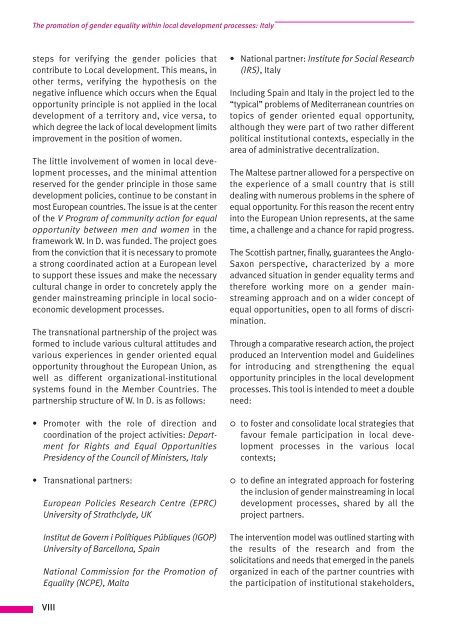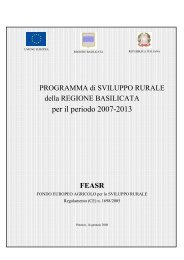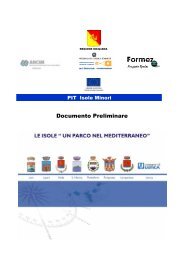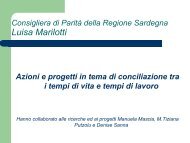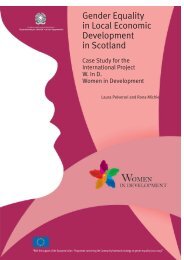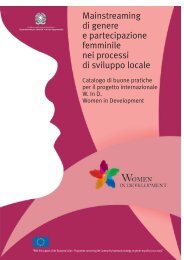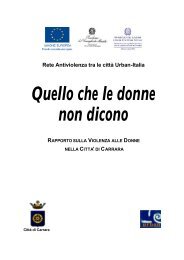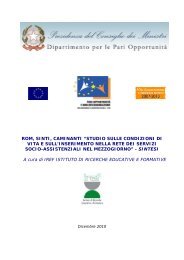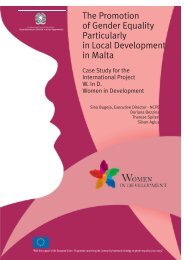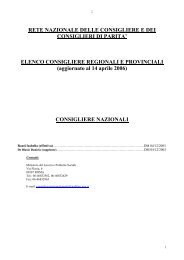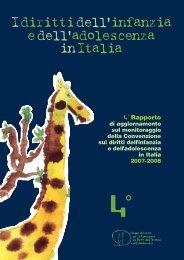The Promotion of Gender Equality within Local Development ...
The Promotion of Gender Equality within Local Development ...
The Promotion of Gender Equality within Local Development ...
Create successful ePaper yourself
Turn your PDF publications into a flip-book with our unique Google optimized e-Paper software.
<strong>The</strong> promotion <strong>of</strong> gender equality <strong>within</strong> local development processes: Italysteps for verifying the gender policies thatcontribute to <strong>Local</strong> development. This means, inother terms, verifying the hypothesis on thenegative influence which occurs when the Equalopportunity principle is not applied in the localdevelopment <strong>of</strong> a territory and, vice versa, towhich degree the lack <strong>of</strong> local development limitsimprovement in the position <strong>of</strong> women.<strong>The</strong> little involvement <strong>of</strong> women in local developmentprocesses, and the minimal attentionreserved for the gender principle in those samedevelopment policies, continue to be constant inmost European countries. <strong>The</strong> issue is at the center<strong>of</strong> the V Program <strong>of</strong> community action for equalopportunity between men and women in theframework W. In D. was funded. <strong>The</strong> project goesfrom the conviction that it is necessary to promotea strong coordinated action at a European levelto support these issues and make the necessarycultural change in order to concretely apply thegender mainstreaming principle in local socioeconomicdevelopment processes.<strong>The</strong> transnational partnership <strong>of</strong> the project wasformed to include various cultural attitudes andvarious experiences in gender oriented equalopportunity throughout the European Union, aswell as different organizational-institutionalsystems found in the Member Countries. <strong>The</strong>partnership structure <strong>of</strong> W. In D. is as follows:• Promoter with the role <strong>of</strong> direction andcoordination <strong>of</strong> the project activities: Departmentfor Rights and Equal OpportunitiesPresidency <strong>of</strong> the Council <strong>of</strong> Ministers, Italy• Transnational partners:European Policies Research Centre (EPRC)University <strong>of</strong> Strathclyde, UKInstitut de Govern i Polítiques Públiques (IGOP)University <strong>of</strong> Barcellona, SpainNational Commission for the <strong>Promotion</strong> <strong>of</strong><strong>Equality</strong> (NCPE), Malta• National partner: Institute for Social Research(IRS), ItalyIncluding Spain and Italy in the project led to the“typical” problems <strong>of</strong> Mediterranean countries ontopics <strong>of</strong> gender oriented equal opportunity,although they were part <strong>of</strong> two rather differentpolitical institutional contexts, especially in thearea <strong>of</strong> administrative decentralization.<strong>The</strong> Maltese partner allowed for a perspective onthe experience <strong>of</strong> a small country that is stilldealing with numerous problems in the sphere <strong>of</strong>equal opportunity. For this reason the recent entryinto the European Union represents, at the sametime, a challenge and a chance for rapid progress.<strong>The</strong> Scottish partner, finally, guarantees the Anglo-Saxon perspective, characterized by a moreadvanced situation in gender equality terms andtherefore working more on a gender mainstreamingapproach and on a wider concept <strong>of</strong>equal opportunities, open to all forms <strong>of</strong> discrimination.Through a comparative research action, the projectproduced an Intervention model and Guidelinesfor introducing and strengthening the equalopportunity principles in the local developmentprocesses. This tool is intended to meet a doubleneed: to foster and consolidate local strategies thatfavour female participation in local developmentprocesses in the various localcontexts; to define an integrated approach for fosteringthe inclusion <strong>of</strong> gender mainstreaming in localdevelopment processes, shared by all theproject partners.<strong>The</strong> intervention model was outlined starting withthe results <strong>of</strong> the research and from thesolicitations and needs that emerged in the panelsorganized in each <strong>of</strong> the partner countries withthe participation <strong>of</strong> institutional stakeholders,VIII


